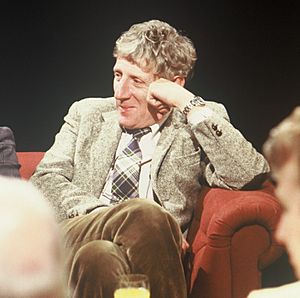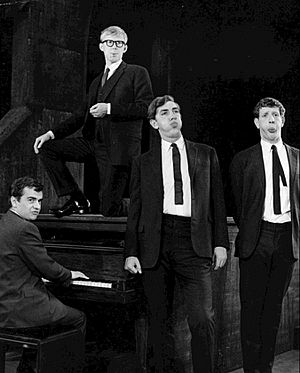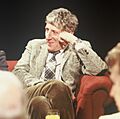Jonathan Miller facts for kids
Quick facts for kids
Jonathan Miller
|
|
|---|---|

Appearing on TV discussion After Dark in 1988: "Alternative Medicine"
|
|
| Born |
Jonathan Wolfe Miller
21 July 1934 St John's Wood, London, England
|
| Died | 27 November 2019 (aged 85) |
| Alma mater | St John's College, Cambridge (MB BChir, 1959) |
| Occupation |
|
| Spouse(s) | Rachel Collet (m. 1956–2019; his death) |
| Children | 3 |
| Parents |
|
Sir Jonathan Miller (born July 21, 1934 – died November 27, 2019) was a very talented English person. He was a director for plays and operas, an actor, a writer, and a TV presenter. He was also a physician, which is a type of doctor.
In the early 1960s, he became famous for a comedy show called Beyond the Fringe. He worked on this show with other well-known comedians like Peter Cook and Dudley Moore. Later, in the 1970s, Jonathan Miller started directing operas. One of his most famous opera productions was Rigoletto in 1982. He set this classic opera in 1950s Little Italy, Manhattan, making it look like a "Mafia" story.
He also worked as a director at the National Theatre and later managed the Old Vic Theatre. Jonathan Miller was a popular TV personality. He wrote and presented many BBC documentaries, sharing his knowledge with people in Britain and the United States.
Contents
Life and Career Highlights
Early Life and Education
Jonathan Miller grew up in St John's Wood, London. His family was Jewish and well-known. His father, Emanuel Miller, was a psychiatrist, a doctor who helps people with their minds. His mother, Betty Miller, was a novelist and wrote biographies.
As a child, Jonathan met with several doctors who specialized in helping children. He also became good friends with Oliver Sacks when he was 12. This friendship lasted throughout their lives.
Jonathan went to several schools, including Taunton School and St Paul's School, London. At St Paul's, he became very interested in science, especially biology. Before finishing school, he even performed comedy on a BBC radio show called Under Twenty Parade.
He studied science and medicine at St John's College, Cambridge. He also joined the Cambridge Footlights, a famous comedy group, and performed in their shows. Even while studying, he appeared on TV and radio. He became a qualified doctor in 1959.
Becoming a Comedy Star

In 1960, Jonathan Miller helped create and perform in a funny show called Beyond the Fringe. It started at the Edinburgh Festival and was a huge success. This show helped launch the careers of Miller, Alan Bennett, Peter Cook, and Dudley Moore.
After the show moved to Broadway in 1962, Miller left. He then became the editor and presenter for the BBC's arts program, Monitor, in 1965.
Jonathan Miller also started directing plays. In 1962, he directed Under Plain Cover by John Osborne. In 1964, he directed The Old Glory in New York City. This play won several awards. He also directed a TV version of Alice in Wonderland for the BBC in 1966.
Exploring Medicine and Opera
From 1970 to 1973, Jonathan Miller studied the history of medicine at University College London. In 1974, he began directing and producing operas. He worked for companies like Kent Opera and Glyndebourne. He also directed The Marriage of Figaro for the English National Opera in 1978.
His opera directing included famous productions like Rigoletto and the operetta The Mikado.
Using his medical background, Miller wrote and presented a BBC TV series called The Body in Question in 1978. This show explored how the human body works.
Shakespeare and the Mind
In 1980, Jonathan Miller joined the BBC Television Shakespeare project. He became a producer and directed six of the plays himself. One of his well-known productions was The Taming of the Shrew starring John Cleese.
He also wrote and presented another BBC TV series called States of Mind in 1983. This series explored how our minds work. In 1984, he studied neuropsychology, which is about how the brain affects behavior. He became a research fellow in this field at the University of Sussex.
Later Career and Beliefs
In 1990, Miller wrote and presented a series called Born Talking: A Personal Inquiry into Language. This show looked at how people learn language, including sign language used by deaf people. He also presented TV series like Madness (1991) and Jonathan Miller on Reflection (1998). The Madness series explored the history of mental health and featured interviews with doctors and patients.
In 2004, Jonathan Miller created a TV series for BBC Four called Atheism: A Rough History of Disbelief. In this series, he talked about his own atheism (not believing in a god) and explored the history of atheism around the world.
He continued to direct plays and operas. In 2007, he directed The Cherry Orchard in Sheffield, his first British stage work in 10 years. He also directed operas in Manchester, Bristol, and Tokyo. He gave talks about his life across Britain.
In 2009, he returned to the English National Opera to direct La Bohème. This production was set in the 1930s. He also directed La traviata in Vancouver in 2011 and Così fan tutte in Washington, D.C. in 2012.
In 2015, the University of London gave Jonathan Miller an honorary degree for his contributions to literature.
Personal Life
Jonathan Miller married Rachel Collet in 1956. They had three children. He lived in Camden Town, London, from 1961 until he passed away. Jonathan Miller died on November 27, 2019, at the age of 85, after a long illness called Alzheimer's disease.
Honours and Awards
Jonathan Miller received many awards and honours for his amazing work:
- Special Tony Award (1963) for Beyond the Fringe.
- Commander of the Order of the British Empire (CBE; 1983).
- Knight Bachelor (2002) for his services to music and the arts, meaning he was given the title "Sir".
- Honorary Fellow at St John's College, Cambridge (1982).
- Honorary Fellow of the Royal College of Physicians.
- Lifetime Achievement Award from the Medical Journalists' Association (2012).
Images for kids
See also
 In Spanish: Jonathan Miller para niños
In Spanish: Jonathan Miller para niños
 | John T. Biggers |
 | Thomas Blackshear |
 | Mark Bradford |
 | Beverly Buchanan |



